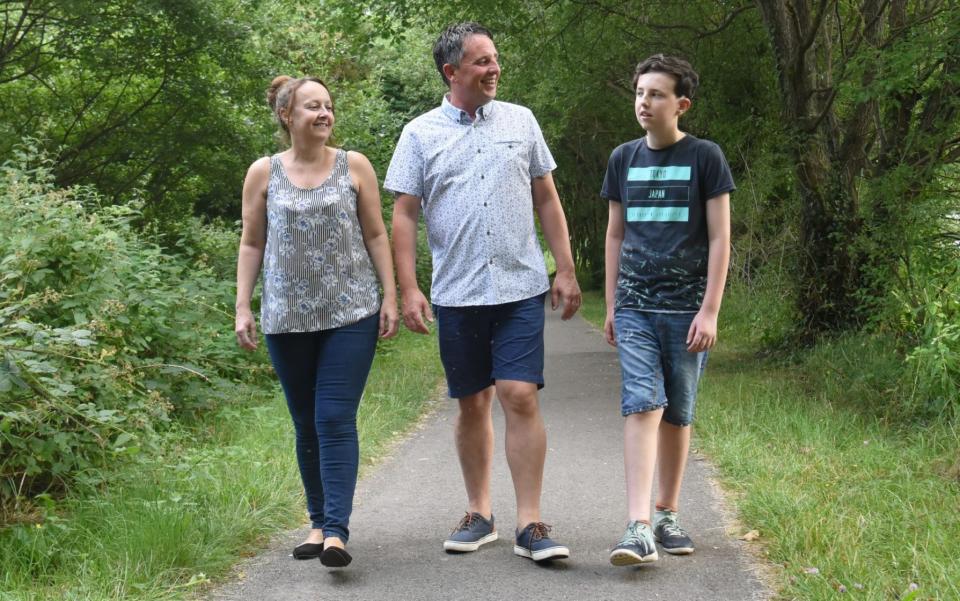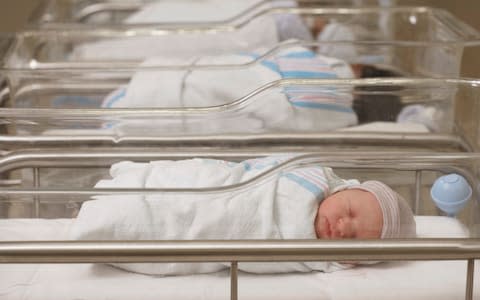Male postnatal depression: are we doing enough to help dads?

It was when Mark Williams saw the surgical instruments on the operating table, and the look of panic on his wife's face, that the terror took hold. "When I heard the word 'emergency', I feared the worst. The doctors sounded anxious, which made me feel anxious. I thought Michelle and my unborn child were both going to die."
The operation was an emergency caesarean section, a procedure performed in hospitals up and down the country every week, but the couple, from the valleys of Bridgend, who had been happily married for a year and a half and were looking forward to becoming parents, were totally unprepared for the knock-on effect it would have on them.
Thankfully, Mark's fears were not realised, and the couple were handed their beautiful baby boy. But, almost immediately, Michelle found depression clawing away at any feelings of happiness. The malaise was unrelenting. At her lowest point, she considered taking her own life and had to be taken to a crisis centre. It was to be 18 months before she felt "normal" again. "Michelle was offered counselling," says Mark, "but no one ever asked me how I felt."
Perinatal or postnatal depression (PND), occurring during pregnancy or in the first year following the birth of a child, can affect up to 20 per cent of women, according to NHS England. What is less documented is the effect it can have on fathers; as yet, there is no formal diagnosis. Symptoms include low moods and energy, constant crying, panic attacks, suicidal thoughts and thoughts about harming the baby. The National Childbirth Trust recognises that postnatal depression can be experienced by men, and recently found that more than one in three fathers (38 per cent) were concerned about their own mental health. Further studies cited by the Scandinavian Journal of Psychology identified eight per cent of men as suffering from depression within the first year of a child's birth.

Mark, 30, took six months off to dedicate himself to looking after his wife and baby son, burying his own feelings so he could support his family. But the traumatic birth, his wife's struggles and the pressures of providing for them pushed him into a breakdown. He suffered mood swings, struggled to bond with his son, and doubted his ability as a father. Suicidal thoughts crept into his mind. Without realising it, he was showing the classic symptoms of postnatal depression. "I just wanted the voices in my head to stop," he says. "I didn't recognise myself any more. I was angry, and drinking to deal with the stress."
His inability to find answers only added to his frustration. "I wish someone had sat me down and told me that many men experience the beginnings of parenthood like this. But no one answered my questions."
Dr Jane Hanley, honorary senior lecturer on perinatal mental health at Swansea University, has been researching the illness for the past 30 years. "Yes, women are more affected by perinatal mental health problems, but recent studies have shown how much fathers can be affected by the mother's postnatal depression. If fathers have underlying depression, the added burden of looking after the mother and child can exacerbate it."
Times have changed from the days when fathers took a back seat in parenting, but mental health provision may not have kept up. "Fathers are more involved in childcare today, but there aren't the resources to include fathers in maternal health services, and there is no means of routinely screening them," says Dr Hanley. Men, she believes, still feel marginalised. "They often leave the room when the health visitor calls. It is so important to address their mental health. If you leave an undiagnosed depressive disorder unchecked, it can impact badly on the mother and infant."

Is it physically possible for men to suffer from postnatal depression in the same way as their partners? "There is little evidence that postnatal depression is entirely hormonal," says Dr Andrew Mayers, a psychologist specialising in perinatal mental health at Bournemouth University. "The vast majority of suffering is down to social factors, such as lack of support, the added pressures of childcare and previous mental health conditions.
"The symptoms men feel are similar to a mother's. Where men mainly differ is in their reluctance to seek help and in internalising their emotions. We need to give dads the tool kit to function and recover."
Mark knew nothing about depression when it came calling. "I come from a small mining community in the Welsh valleys where you just don't talk about mental health. If you felt bad, you had to man up. I didn't tell anyone how I was feeling. I was worried I would be sectioned, or that they would take the baby off us."
In the first six months of his son's life, he isolated himself from his friends, pretended to go to work, and kept a smile on his face. "I hid it well."
After six years of burying his emotions, an unlikely encounter in a local gym changed everything. "It was a strange scene - two guys, standing by the weights, talking about our feelings. I told this stranger, Brian, more than I had said to my best friends," Mark reveals. Brian's wife had battled with PND, and he too had experienced a breakdown. "His world became a dark place and he didn't know how to cope. It was like hearing my own story."
Encouraged to open up, and with support from his wife, Mark sought professional help. A course of cognitive behavioural therapy set him on the path to recovery, although he admits he does not want any more children for fear of the illness striking again.
Most men try to suppress their feelings, which only makes things worse
Mark is now an award-winning mental health campaigner, recognised as a "Local Hero" at the Pride of Britain Awards, and was chosen to meet the Royal family to discuss perinatal mental health.
He has set up a website, Fathers Reaching Out (reachingoutpmh.co.uk), to help other dads battling with depression, and has written a book about his experiences, Daddy Blues (Trigger Publishing). "Postnatal depression does not have a gender. Dads go through it too," says Mark. "Hormones have their part to play, but I have spoken to so many dads who have suffered depression after the birth of a child. Most don't talk about their feelings and try to suppress them, which only makes things worse."
His family are in a good place now, he says. "I know if my son ever struggles with his mental health, he will talk about it - he is probably the most educated 13-year-old in mental health there is!"
Mark also believes that mental health provision for fathers must start early. "I want every health visitor to take five minutes out with the dad. The more men can talk about it, the more it can save lives. It saved mine."
For more information, see the National Childbirth Trust, and the Campaign Against Living Miserably

 Yahoo News
Yahoo News 